
For thousands of young American men and women, serving in the military has long been a path to both social and economic mobility. Military service is a great way to see the world while learning valuable skills that can be transferred to civilian life. It’s just one of many reasons young adults decide to join the military after high school.
There’s no denying the discipline, focus, and responsibility you learn when serving in the military benefits you for the rest of your life. But before you enlist, it’s important to have a thorough understanding of both the risks and benefits of military life and understand exactly what a commitment to a career in the armed forces involves.
Not sure whether to choose college or the military after earning your high school diploma? Read on to learn more about military options after high school and how to join if you decide it’s the right fit for you.
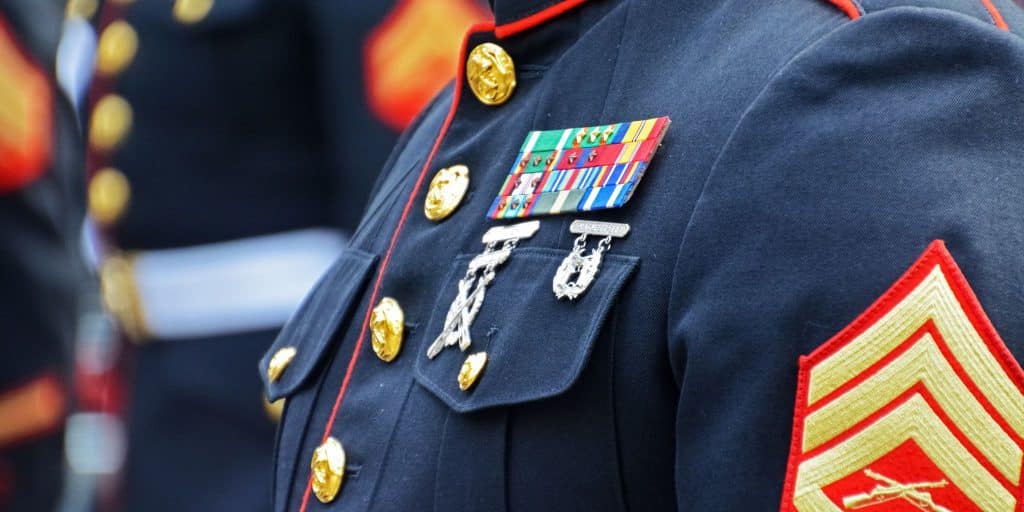
Why Join the Military After High School?
With the sticker price of public and private colleges at an all-time high, many high school graduates are considering enlisting in the military after high school. Reducing the net price of college education is often a driving force. They’re also finding military service can help them achieve many other goals with plenty of lifelong benefits.
Thanks to GI Bill education benefits, military service can help fund a bachelor’s degree, graduate programs, and professional certificates. Here are some of the main benefits of joining the military after high school.
1.) Find Your Purpose
Between the ages of 18 to 29 people are in a transitional period from adolescence to adulthood. At this age, it can be daunting to determine your identity, figure out what you want to do, and discover where you fit into society. It’s no surprise almost half of all college students drop out before graduating with a degree.
While there are many variables affecting the dropout rate, students often quit because they simply are not prepared. They commit to school without knowing whether they actually want to attend college or specifically what they want to study. Serving in the military after high school can provide the perfect combination of both independence and support. This can help people find their footing and discover purpose before embarking on different career paths in the future.
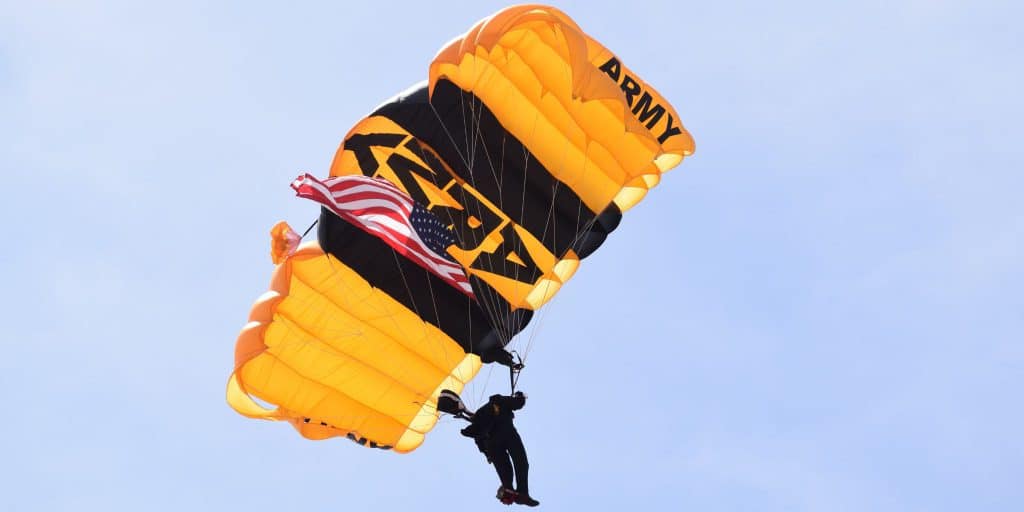
2.) College Tuition with No Debt
The constantly rising costs of higher education have led to an increasing number of high school graduates considering alternatives to college. Even with merit- or need-based scholarships, students only enjoy a discount of a few thousand dollars per year. Excessive student loan debt can have significant consequences over a lifetime and can affect decisions like purchasing a home, getting married, or having kids. Today graduates are accepting jobs outside of their fields of interest, working long hours, or working multiple jobs to supplement their income and pay off student debt.
While entering the military after high school doesn’t guarantee a free college degree in the future, it provides significant financial benefits for service members who do attend college, as they are eligible for tuition assistance while on active duty or in the Reserves. This can help you pay for college by covering up to 36 months of financial assistance for tuition, fees, supplies, textbooks, and housing.
3.) Learn Valuable Skills
Each of the five U.S. military branches offers training programs that can both improve your service in the military and enhance career opportunities as a civilian.
Joining the military after high school isn’t all about fighting; many veterans go on to pursue a wide range of career paths including news and media, engineering, arts and photography, human resources, healthcare, aviation, and many more. During your service commitment as an enlistee, you can also receive college credits for your experience that are accepted by thousands of colleges and universities.
There is also the option to undergo professional or technical training, allowing you to gain certificates or licensing for civilian jobs like software engineering. In addition to professional expertise, employers value candidates with military experience.
4.) Higher Income Potential
In 2019, Pew Research used data compiled over forty years to create a report that suggested veteran households tend to have higher incomes and living standards. This could be due to several factors, including that those who serve in the United States military after high school enjoy a strong level of job security. There are more opportunities for gainful employment as a civilian thanks to the several professional skill-building opportunities learned through military service.
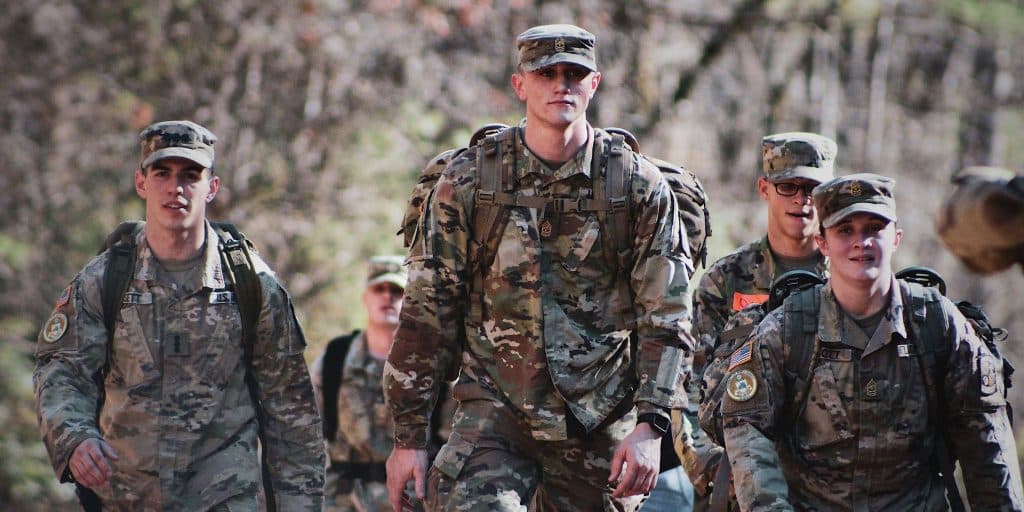
What Are Military Benefits?
All members of the armed services are entitled to certain benefits both during and after service. The benefits of going into the military after high school often appeal to new graduates because they provide a well-rounded salary, healthcare, and finance options. These include:
1.) Basic Pay
Typically, enlistees will enter the service at the E-1 service grade. The rates of pay are automatically increased year-on-year via a cost of living adjustment.
2.) Special Pay
Members of the military service are also eligible to receive incentives and special pay based on factors such as skills, locations, or assignments. For example, this could include additional pay for the ability to speak a foreign language, undertaking hazardous duty, or taking on a special duty assignment.
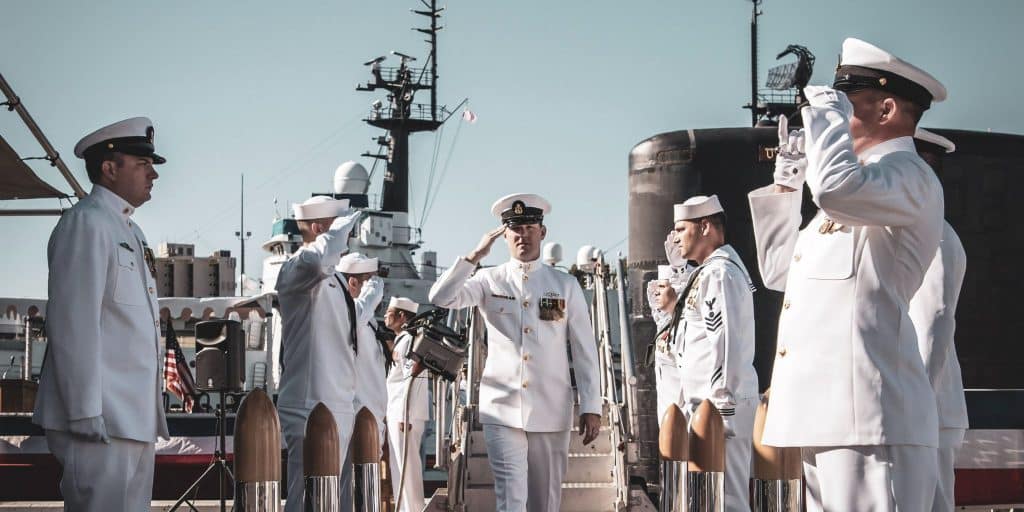
3.) Free Accommodation and Uniforms
Military members who are unmarried with no children are provided free housing in barracks on the base. Sharing a single room entitles you to extra pay, and if you live off-base, you will receive a tax-free housing allowance. All active-duty military members are eligible for a tax-free monthly food allowance that can be used in both on- and off-base dining halls. Recruits also receive a complete set of uniforms during their initial basic training and a clothing allowance to replace uniforms as they are worn.
4.) Free Dental and Health Care
A program called Tricare Prime provides free health and dental care to all active-duty members. It is often provided through an assigned primary care provider and is typically located at the base. Veterans who have over two years of active service or a service-related disability qualify for lifetime Veteran Administration healthcare benefits. Members with a service-related disability can also qualify for over $3,000 worth of benefits each month from the VA.
5.) Home Financing
Both current members of the military service and veterans are eligible for home loans guaranteed by the federal government. The program provides 100% financing of homes that conform to certain requirements. There is no limit to the number of times that a veteran can use this benefit to buy a home.
What Are the Branches of the Military?
If you’re wondering ‘Should I join the military after high school?’, you’ll need to consider which branch of the military you’re interested in. There are five U.S. military branches: the Army, Air Force, Marine Corps, Navy, and the Coast Guard.
1.) The Army
The Army is the main force on the ground, with a primary function to defend and protect the U.S. and its interests. This is done using ground troops, artillery, armor, tactical nuclear weapons, helicopters, and other weapons. The Army is the oldest U.S. military service and was officially established by the Continental Congress in June 1775. It is also the largest of the military services and is supported by the Army Reserves and the Army National Guard, which offer trained personnel and equipment during times of need.
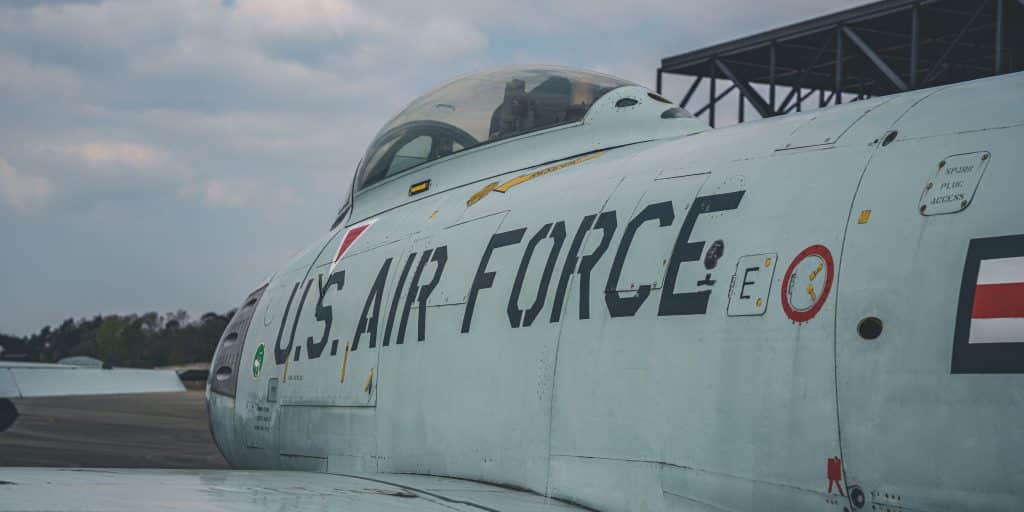
2.) The Air Force
The Air Force is the newest branch of the military, established as a separate branch after WWII, which showed airpower had more potential than ground troops for winning a war. The Air Force’s primary mission is to defend the U.S. and its interests using fighter aircraft, bomber and tanker aircraft, helicopters, and transport aircraft. It is responsible for all military satellites and controls strategic ballistic nuclear missiles.
3.) The Navy
Like the Army, the Navy was established in June 1775. Its primary mission is to protect and maintain U.S. interests at sea. During times of conflict, the Navy supports Air Force airpower, as Navy aircraft carriers can often be used to deploy to areas that cannot sustain a fixed runway. Navy ships are designed to attack land targets from miles away using cruise missiles and heavy guns, while stealth attacks are often carried out by submarines. The Navy is also responsible for moving Marines to areas of conflict.
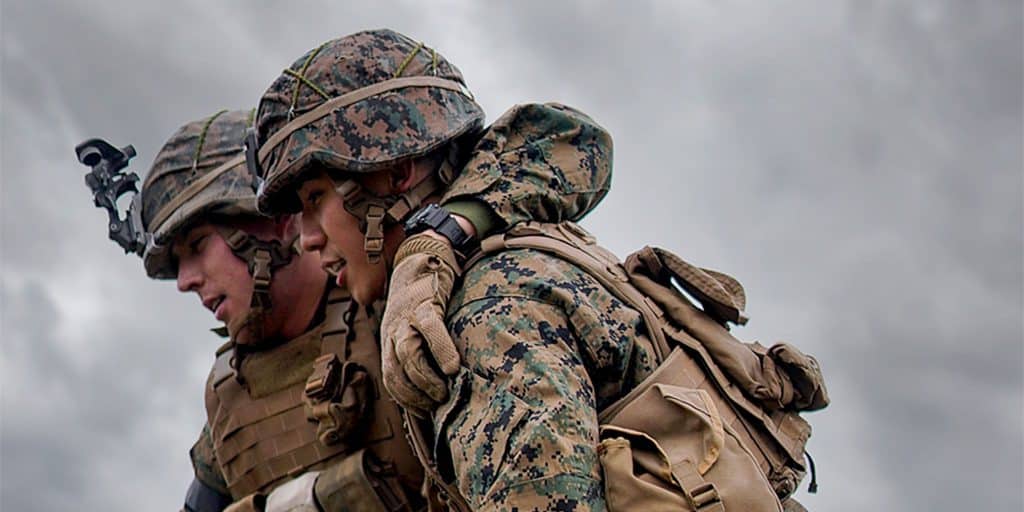
4.) Marine Corps
The Marines are specialists in amphibious operations. Their primary responsibility is to provide a route to attack the enemy from any direction by capturing and controlling beachheads. The Marines were established in November 1775 as a landing force for the U.S. Navy. In recent years, their operations have expanded to ground combat. The Marine Corps is mostly self-sufficient with their own airpower but uses the Navy for administrative, logistical, and medical support.
5.) Coast Guard
The U.S. Coast Guard is the smallest of all military branches and was established in 1790 as the Revenue Cutter Service. During peacetime, the Coast Guard is responsible for law enforcement, sea rescue, boating safety, and the control of illegal immigration. In times of conflict, all or part of the Coast Guard can be transferred to the Navy by the President.

Which Military Branch Should I Join?
No military branch is “better” than the other, but certain branches might be better choices for individuals, depending on their interests, goals, and skills. However, you don’t need to possess any of specific skills to join, as full training will be provided to you as an enlistee. Deciding to join the military after high school requires some internal questioning. Before you determine which branch to join, learn more about what you will be expected to do and ask yourself which you see yourself doing the most.
1.) The Marines
If you want a complete change of lifestyle, are comfortable handling a gun, and want a career that provides you with a deeply ingrained sense of commitment, service, and pride, the Marines could be the best branch for you.
2.) The Army
If you want a flexible lifestyle combined with a strong sense of being in the military, you may enjoy the benefits of joining the Army after high school. The Army could be a great fit if you could see yourself crawling through the mud and blowing things up while having the chance to travel the world.

3.) The Navy
If the ability to travel is non-negotiable to you, the Navy is probably the best branch to join. There are only a handful of jobs in the Navy that don’t spend a significant amount of time at sea; you can expect to spend a lot of time away from home assigned to a ship or submarine.
4.) The Air Force
If you want to join the military but still feel like you have a regular job, the Air Force could be ideal. It’s also the best service to join if the quality of life, such as base housing units and dormitory conditions, is important to you. However, keep in mind that Air Force admissions are considered highly competitive.
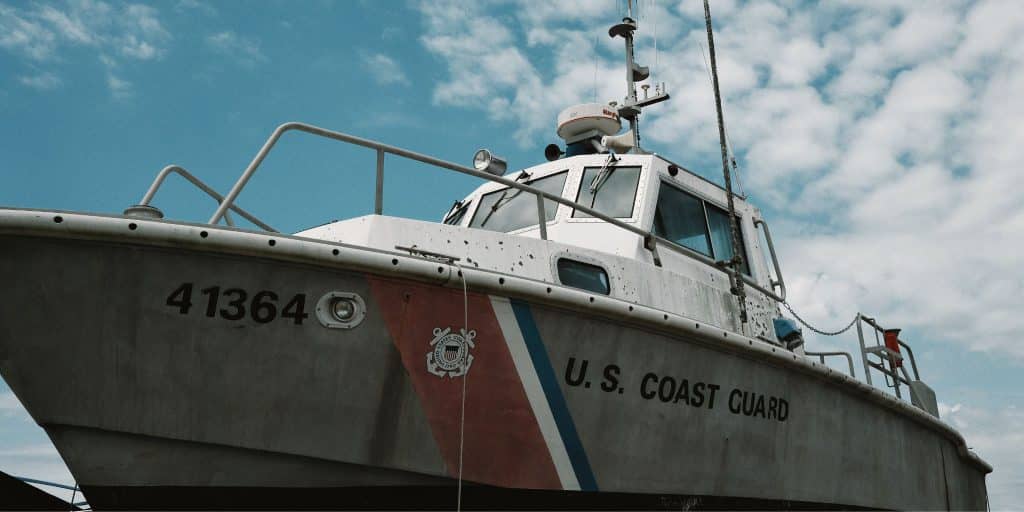
5.) Coast Guard
The Coast Guard is ideal for anybody who wants a real peacetime mission and can see themselves working in law enforcement and sea rescue. It also provides you with a range of skills ideal for landing a civilian job or a job in another law enforcement capacity.
If you’re graduating high school soon and aren’t sure what you want to do next, joining the military after high school could be a great step forward in your future career. Of course, this decision should not be taken lightly. If you’re considering joining the military after high school, reach out to speak with a career counselor or military recruiter to learn more.










